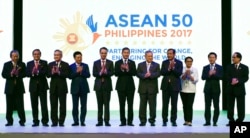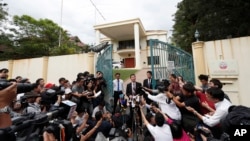China’s foreign minister Wang Yi held a bilateral meeting with his North Korean counterpart Ri Yong Ho Sunday on the sidelines of the Association of Southeast Asian Nations (ASEAN) ministerial meetings in Manila. Wang said he urged Ri to adhere to U.N. resolutions and stop provoking the “international community’s goodwill” with missile launches and nuclear tests.
Wang also said he advised his North Korean counterpart to take a “double suspension” approach to easing tensions on the Korean Peninsula, an approach calling for the suspension of North Korea’s nuclear tests and the suspension of joint military drills by the U.S. and Japan.
A warning to North Korea by foreign ministers from the 10 ASEAN countries is expected to soothe the U.S. government, which the ministers hope will play a stronger role in their region. At the same time they hope to protect their own ties with Pyongyang.
On Saturday, ASEAN ministers expressed “grave concern” about escalating tensions on the Korean Peninsula, including North Korea’s intercontinental ballistic missile tests in July and two recent nuclear tests. It asked North Korea to fulfill all U.N. Security Council obligations and stop the tests.
ASEAN’s foreign ministers want to help improve relations between North and South Korea, the group said in a statement at a meeting in Manila. Each Korea claims the other despite self-rule on each side since the 1950s.
US role suspected
Although the U.S. government has leaned on much of Asia to condemn North Korea’s tests of nuclear weapons and ballistic missiles, a Philippine foreign affairs spokesman declined to make a U.S. connection. The Philippines is ASEAN chair this year.
The statement, the second by ASEAN this year, was born out of Southeast Asia’s proximity to North Korea and the increase in weapons tests, said the spokesman, Robespierre Bolivar. North Korea has tested missiles, including an ICBM, seven times since April.
“The North Koreans have tested more weapons in the past couple of months of 2017 than previously and this is a statement of that concern,” Bolivar told a news conference Saturday while declining to answer a question about U.S. pressure. “First primarily, geographically the Korean Peninsula is very close to us.”
But scholars suspect a U.S. role. U.S. Secretary of State Rex Tillerson is attending part of the ASEAN ministerial meetings in Manila, and Southeast Asian countries hope to cement relations with Washington under President Donald Trump, as many are unsure how his Asia policy will shape up. Trump has raged against North Korea’s weapons tests.
The ASEAN statement plays to U.S. interests while using language that’s conciliatory enough to protect its members’ ties with North Korea. Language in the statement such as urging parties to “exercise restraint” was to be expected, said Huang Kwei-bo, associate diplomacy professor at National Chengchi University in Taipei.
“To encourage peaceful dialogue and then specific settlement disputes, I think ASEAN in principle should do things that way,” Huang said.
Diplomatic, financial ties
The 10 ASEAN countries recognize North Korea diplomatically and North Korea has embassies in eight of them, forming an outlet for the hermit state’s money-making activities abroad. Southeast Asian companies in turn have been allowed to do business in the normally off-limits country.
Some North Korean embassies effectively do business for Kim Jong Un’s government, possibly tempering any resolve in Southeast Asia to upset it, said Sean King, senior vice president of New York-based political consultancy Park Strategies.
“In addition to supporting ostensibly legitimate businesses like ginseng sales and restaurants, these embassies act as control centers for the North’s regional smuggling networks and other plainly illicit operations,” King said.
ASEAN also prides itself on unity despite disputes, and North Korea sent people to this month’s ASEAN event, one of Pyongyang’s few forays abroad.
A North Korea-Southeast Asia connection came to light in February when Kim’s estranged half-brother was killed in Malaysia.






